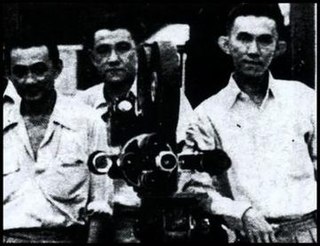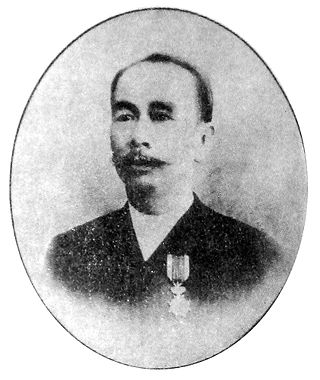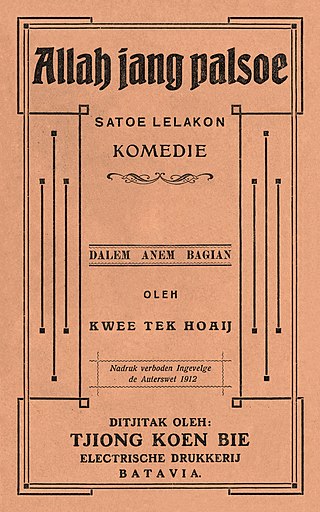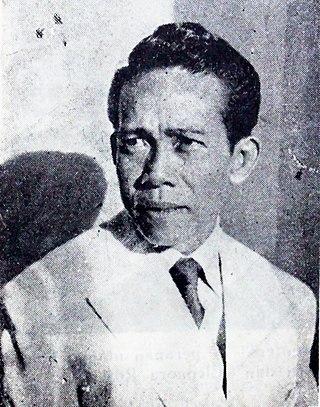
Abisin Abbas, better known by his pseudonym Andjar Asmara, was a dramatist and filmmaker active in the cinema of the Dutch East Indies. Born in Alahan Panjang, West Sumatra, he first worked as a reporter in Batavia. He became a writer for the Padangsche Opera in Padang, where he developed a new, dialogue-centric style, which later spread throughout the region. After returning to Batavia in 1929, he spent over a year as a theatre and film critic. In 1930 he joined the Dardanella touring troupe as a writer. He went to India in an unsuccessful bid to film his stage play Dr Samsi.

Fifi Young was an Indonesian actress of mixed French and Chinese descent who acted in at least 86 films over her 34-year career.

The Wong brothers were three ethnic Chinese film directors and cameramen active in the cinema of the Dutch East Indies. The sons of an Adventist preacher, the brothers – Nelson (1895–1945), Joshua (1906–1981), and Othniel (1908–1986) – received much of their education in the United States before going to Shanghai and establishing The Great Wall Productions.

Njoo Cheong Seng was a Chinese-Indonesian playwright and film director. Also known by the pen name Monsieur d'Amour, he wrote more than 200 short stories, novels, poems and stage plays during his career; he is also recorded as directing and/or writing eleven films. He married four times during his life and spent several years travelling throughout Southeast Asia and India with different theatre troupes. His stage plays are credited with revitalising theatre in the Indies.

Dardanella was a touring theatre company from the Dutch East Indies established by Willy A. Piedro in 1926. Arising from a background of musical theatre, the troupe focused on realistic stories, both adaptations of foreign works and original stage plays about life in the Indies. Starring Dewi Dja' and Tan Tjeng Bok, the troupe performed original works by Piedro and Andjar Asmara. Popular both in the Indies and abroad, Dardanella dissolved during an international tour after 1936. Several of its members later went into film.

Sair Tjerita Siti Akbari is an 1884 Malay-language syair (poem) by Lie Kim Hok. Adapted indirectly from the Sjair Abdoel Moeloek, it tells of a woman who passes as a man to free her husband from the Sultan of Hindustan, who had captured him in an assault on their kingdom.

Lie Kim Hok was a peranakan Chinese teacher, writer, and social worker active in the Dutch East Indies and styled the "father of Chinese Malay literature". Born in Buitenzorg, West Java, Lie received his formal education in missionary schools and by the 1870s was fluent in Sundanese, vernacular Malay, and Dutch, though he was unable to understand Chinese. In the mid-1870s he married and began working as the editor of two periodicals published by his teacher and mentor D. J. van der Linden. Lie left the position in 1880. His wife died the following year. Lie published his first books, including the critically acclaimed syair (poem) Sair Tjerita Siti Akbari and grammar book Malajoe Batawi, in 1884. When van der Linden died the following year, Lie purchased the printing press and opened his own company.

Astaman also known as Tirtosari, was an Indonesian actor active from the 1910s until the mid-1970s. He was a leading actor in the influential theatre company Dardanella and, after entering the film industry with 1940s Kartinah, acted in 43 films.

Gagak Item is a 1939 bandit film from the Dutch East Indies directed by Joshua and Othniel Wong for Tan's Film. Starring Rd Mochtar, Roekiah, and Eddy T. Effendi, it follows a masked man known only as "Gagak Item". The black-and-white film, which featured the cast and crew from the 1937 hit Terang Boelan, was a commercial success and received positive reviews upon release. It is likely lost.

Zoebaida is a 1940 film from the Dutch East Indies directed by Njoo Cheong Seng. A romance set in Timor, it starred Njoo's wife Fifi Young and was the film debut of Soerip. Shot over a period of 27 days in a Dutch-owned studio, the film received middling reviews. It is likely lost.

Air Mata Iboe is a 1941 drama film from the Dutch East Indies directed and written by Njoo Cheong Seng. Starring Fifi Young, Rd Ismail, Ali Sarosa, and Ali Joego, it followed a mother who raises her children lovingly but is ultimately betrayed by her eldest sons when she falls upon hard times. The film, billed as a "musical extravaganza," featured a soundtrack by R. Koesbini, and an eponymous title song written by Njoo.

Sorga Ka Toedjoe is a 1940 film from the Dutch East Indies directed by Joshua and Othniel Wong for Tan's Film. It follows an older couple who are reunited by another, younger couple after years of separation. The black-and-white film, the first production by Tan's Film after the departure of Rd Mochtar, featured kroncong music and was targeted at lower-class native audiences. It was a commercial and critical success. Roekiah and Djoemala took leading roles in three more films before Tan's closed in 1942. Sorga Ka Toedjoe is now thought lost.

Phoa Keng Hek Sia was a Chinese Indonesian Landheer (landlord), social activist and founding president of Tiong Hoa Hwe Koan, an influential Confucian educational and social organisation meant to better the position of ethnic Chinese in the Dutch East Indies. He was also one of the founders of Institut Teknologi Bandung.

Allah jang Palsoe is a 1919 stage drama from the Dutch East Indies that was written by the ethnic Chinese author Kwee Tek Hoay based on E. Phillips Oppenheim's short story "The False Gods". Over six acts, the Malay-language play follows two brothers, one a devout son who holds firmly to his morals and personal honour, while the other worships money and prioritises personal gain. Over more than a decade, the two learn that money is not the path to happiness.

Tio Tek Djien, also styled T. D. Tio, Jr., was a Chinese Indonesian stage manager and playwright turned film producer.

Oriental Film was a film production company in Batavia, Dutch East Indies. Established by ethnic Chinese businessman Tjo Seng Han in 1940, it completed four black-and-white films before it was closed in 1941. All the company's films were screened into the 1950s but may now be lost. They were directed by two men, Njoo Cheong Seng and Sutan Usman Karim, and launched the careers of actors such as Dhalia and Soerip.

Rempo Urip was an Indonesian film director. He began his career in the theatre, serving as an extra and footballer for the Dardanella theatre company beginning in 1934. After six years and three troupes, Urip entered the film industry, working as a distributor for Oriental Film and assistant director for Java Industrial Film. He returned to the theatre during the Japanese occupation (1942–1945) and national revolution (1945–1949). In 1951 he joined Djamaluddin Malik's Persari as a director, completing thirteen films for the company before it closed in 1958. He continued as a freelance director until 1977.

Lauw Giok Lan was a Chinese Indonesian journalist and writer. He was one of the founders of the newspaper Sin Po.
Miss Riboet II, also known as Miss Riboet Muda, was an Indonesian actress and singer who was active from the 1920s until 1950s and was one of the top five stars of Dardanella, along with Devi Dja, Astaman, Tan Tjeng Bok, and Ferry Kock. She was the mother of actress Netty Herawaty and was considered as the part of Classical Indonesian Cinema.



















